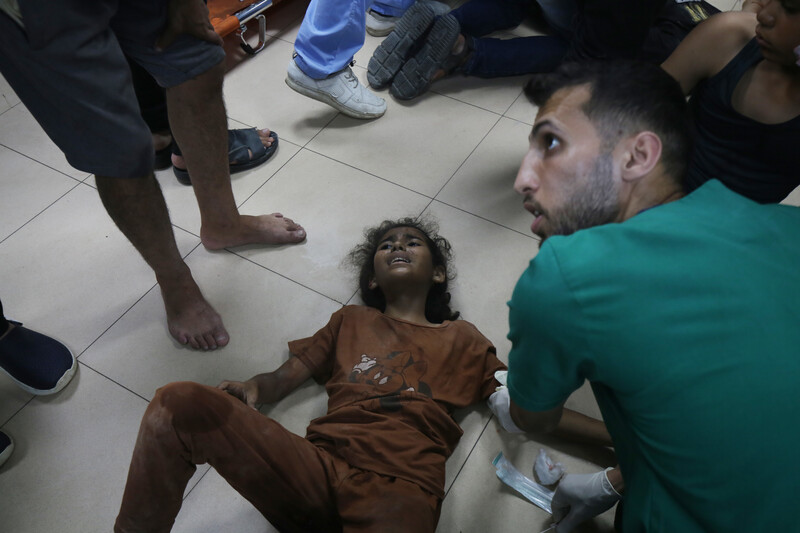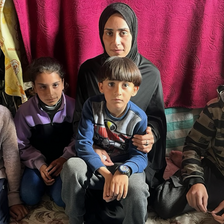The Electronic Intifada 13 June 2024

A nurse attends to an injured child on 5 June at the Aqsa Martyrs’ Hospital in Deir al-Balah. There is nothing “post” about Palestinian trauma, which is continuous and inter-generational.
APA imagesIn September 2023, I attended the annual meeting of the Israeli Committee Against House Demolitions in London , having reconnected with the organization’s cofounder, Jeff Halper, in Jerusalem a few weeks before.
One of the speakers was Yoa’d Ghanadry-Hakim, a clinical psychologist with the Palestinian Counseling Center in Beit Hanina.
According to the website, the center was “founded in Jerusalem in 1983 by a group of psychologists, educators and community activists … to work with all members of the Palestinian Society exposed to political, social, economic and psychological prejudice and violence in order to support and develop the psychosocial concepts of services in Palestine.”
Hakim said that, when discussing Palestinian psychology, the term PTSD (post-traumatic stress disorder) was entirely inappropriate.
PTSD, which was not classified by the American Psychiatric Association (APA) as a distinct mental health disorder until 1980, is a Western concept. The origins of the classification date to World War I, with the term “shell shock,” which included symptoms of tremors, memory loss and nightmares.
There is nothing “post” about Palestinian trauma. It is individual and collective, direct and indirect, continuous and cross- and inter-generational, Hakim asserted.
Even the therapeutic vocabulary imposed by often well-meaning experts to try to diagnose, treat and encompass Palestinian lived experiences is determined by Western mindsets; once again, Palestinian truth is diminished, silenced and denied.
Forced from home
A friend I will call Hiba to protect her real identity came to the conference with me.
I first met Hiba in Rashidieh, a Palestinian refugee camp near Tyre in southern Lebanon, in 1998.
I was volunteering with Unipal, a British education exchange that has been sending students to stay with Palestinians in Lebanon, the West Bank and Gaza Strip since 1972.
The exchange’s aim is both pragmatic and deeply emotional.
In both Lebanon and the occupied Palestinian territories, we volunteered with local nongovernmental organizations and led activities over the summer for Palestinian children for whom education was then – and continues to be – disrupted on any number of levels.
Schools lack resources, electricity can be shut off, and students are often denied access to schools due to Israeli military blockades or attacks.
But beyond this, our presence was a demonstration of solidarity – intangible, unquantifiable and yet vital: Palestinians told us that that it showed them that they had not been forgotten. They shared directly with us their stories, ones that had been – and continue to be – systematically suppressed.
In turn, we came back to the United Kingdom and advocated on their behalf.
Hiba is the oldest sister of five siblings, and, in the course of her life, she would come to be those siblings’ caregiver.
Hiba’s parents were forcibly displaced from their village, Suhmata, in northern historic Palestine, in 1948.
I dislike the words “forcibly displaced.” The legalistic terminology belies the harsh reality of families fleeing violence in the form of armed attacks, gunfire, rape.
Hiba’s parents ended up in a tent in Lebanon alongside thousands of other Palestinians who were told that they would be eventually allowed to return to their homeland.
They have never been permitted to do so, despite numerous United Nations’ resolutions enshrining in international law the right of return of displaced Palestinians and their descendants.
Old wounds
The tents gradually morphed into makeshift dwellings and then to breezeblock and cement houses. In 1982, during the now-infamous Israeli-led attacks on Lebanon and in particular on Sabra and Shatila refugee camps in Beirut, Hiba, her siblings and parents were forced to try to flee danger once again.
Israeli soldiers opened fire and shot Hiba’s parents dead in front of her.
At age 14, she effectively became an adult.
When I met her all those years ago, Hiba was working with the local staff of an international NGO, running programs across Lebanon. Each day, she would return home to cook and look after two of her siblings who still lived with her. Those two siblings had been diagnosed with schizophrenia, which, Hiba was sure, was caused by the deep trauma of their childhood.
Two other siblings had been separated from them after their parents were killed and raised in an SOS village in Switzerland. Hiba considers herself lucky: She obtained a Schengen visa from the EU to travel once a year to visit them.
Hiba, who got married a few years after I met her, has never been able to have children
We sat together at the conference last September and Hiba cried. For her, listening to a psychologist discuss the trauma endured by Palestianians was like listening to a depiction of her own mental health issues.
Seven days later, in October 2023, the world turned on its axis and Gaza entered into a living hell. Footage emerged of Palestinian children having their already precarious childhoods ripped from them. Macabre footage was shown of child-sized body bags and of children, younger than my 10-year-old daughter, cradling a baby, trying to feed her, his other siblings huddled around him. The boy was now both mother and father to his siblings.
My heart rose to my throat, my chest tightened. I couldn’t breathe.
Hiba left a message. The wound that has never fully healed has been reopened.
I recall the words of my Palestinian-Jordanian Arabic-language tutor when I was about to graduate university. Having been twice to Lebanon, I was now preparing to live in Ramallah, in the West Bank.
“Find another cause, ya Amy,” he said. “Palestine will bring you nothing but heartache.”
Nearly a quarter of a century on, my heartache is stronger than ever.
Survivor’s guilt
Eight months in, and counting, and I am listening to the testimonies of doctors, nurses and midwives who have responded to calls from international aid organizations to assist in Gaza.
They pay testament to the strength of their local colleagues. They explain what they have seen: countless shrapnel wounds, severely injured children.
They recount what they have had to do: reuse, dozens of times, medical equipment designated for single use; perform amputations without anesthesia; choose whose lives they can save and whom they must move to the floor to let die.
They describe what they have smelled — the stench of pus oozing from wounds; the putrid odor of unburied, decaying bodies.
When their missions come to an end, they leave their hearts and minds behind in Gaza and carry through the Rafah crossing to Egypt the burden of survivor’s guilt.
They leave behind them the injured, the dying, the bereaved; they leave behind them a population overwhelmed by a tsunami of trauma, grafting itself onto the deep-rooted ancestral pain of the past 75 years.
Khaled Dawas, a consultant surgeon from London who has volunteered with international aid organizations multiple times, tells me that they are the lucky ones, because they have been able to enter Gaza.
He tells me, too, that these talks he gives back in the UK are a salve of sorts.
It’s a kind of therapy, for yet another kind of trauma.
Amy Abdelnoor is an Arab-British writer and teacher who lived and worked in the West Bank and Palestinian refugee camps in Lebanon; her work-in-progress, inspired by her experiences, was shortlisted for the 2023 Lucy Cavendish Fiction Prize.





